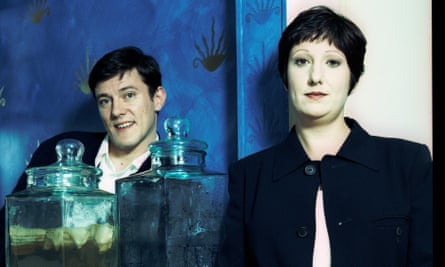Gillian Gilbert’s story as a musician – along with the numerous unseen women who worked for Factory Records – started well before the label became a sensation in 1983 with New Order’s Blue Monday. Gillian learned guitar and keys, occasionally played on stage with Joy Division, and later became a member of New Order – joining Stephen Morris, Bernard Sumner, and Peter Hook – following the tragic death of Ian Curtis in 1980.
I got to know everybody [in New Order] and the manager, Rob [Gretton]. It was the manager who suggested, when Ian died, to bring another singer in, which they didn’t want to do. Eventually he said: “Why don’t you just bring somebody in that nobody thought would be brought in?”
Especially being a woman, I think it was an appealing idea. I didn’t really know much about songwriting, so it was a bit daunting, and they were calling me “the apprentice”. I thought they’d teach me to write songs, but the more I got to know about songwriting, the more I could do it myself. When I got asked to join New Order, I was at Stockport College doing graphic design. I did one year there, and I thought, “I can’t ask my mum and dad if I can go off with this band.” I thought they’d never let me go, but they surprised me.
It seemed like a dream, really. A dream come true. I was a bit daunted because they were obviously songwriting, and I couldn’t play keyboards at all, and I thought I’d just play guitar. But they said, “Well, we’ve got some keyboard parts.” So, I got my sister’s Bontempi organ out. She’s very good at music, was in a brass band, and played clarinet. She could do everything. She’s so jammy. And she’s really good at school as well. I just played guitar – my uncle taught me, and we used to do that on weekends when I stayed with them in Manchester. But I got that Bontempi organ and learnt all the songs that New Order had already written before I joined.
Only Stephen knew about music because he did drum lessons, but Bernard and Hooky were self-taught, so they had their own style. I thought if I did lessons, it might ruin things, but I ended up doing piano lessons first, and I did that with my mum, and she loved it. I got to learn about reading music and doing the keys. So then, when I came back to New Order, Barney was like, “I can’t get my voice to go high enough – can you change the key?” I knew what to do.
The idea was to get me on to play [1981 debut single] Ceremony because that was the end of the Joy Division songs. So I went in with Martin [Hannett, Joy Division producer], and I couldn’t believe how he made you play the same thing over and over again. But then, when we went to London to do [debut album] Movement, I think he wasn’t really into producing New Order. I think he sort of got round to thinking, “Well, it is their first record and with Ian dying …” I think it was hard for him to work with us, but I thought everything he did was wonderful.
The Brixton riots were going on outside the studio when we were recording Movement, and that was pretty frightening. You could hear all the noise. We were on the second floor. You looked through the windows and you could see and hear all this rioting. That was the backdrop of Movement, of going to London to record after we’d done a bit in Manchester.
I remember I did two notes on that bass line on Age of Consent [from New Order’s second album Power, Corruption and Lies in 1982] and I was pretty pleased because we used to record everything on a four-track. We used to record our jams, which is how we worked. Those jams meant everybody playing at once in our rehearsal studio, which Hooky liked doing. So, I think that was one of my first moments of “Oh, I’ve done two notes!” It was like, “Oh, what did you play there, Gillian?” I said a C and an F, and he was like, “Ooh.” And then it all took off from there. Bernard didn’t like doing vocals in the rehearsal rooms, so a lot of the time he used to jam the words at a concert and just come up with a bridge, and then we’d listen back to the gig and pick which words we wanted to take to the studio – we’d pick bits of all the lyrics and then write the missing gaps.
Love Vigilantes [on New Order’s third album, 1985’s Low-Life] was a little bit about the war in the Falklands, our sort of country & western song, and another one where I did the bass line of the track – one of my first real songwriting things. The Perfect Kiss [on Low-Life] was a bit like Blue Monday, where we just stuck all the bits that we liked together. We bought an Emulator, and we put frogs on that one. Stephen did the frogs. We put sheep on Fine Time, which was on another album [1989’s Technique]. We liked playing around with that.
Sub-culture [also from Low-Life] was one of those night-time songs, coming about because we were staying so late jamming. These fetish clubs that had started, like Skin Two [in London’s Soho], opened at 4am, so they were the only places to go at that time if you’d just finished in the studio. I wasn’t into that scene, or I don’t think so, anyway. Barney and Hooky might have been! Hooky was wearing his boots back then, and a ponytail and leather jeans, and bondage T-shirts. We used to know a journalist who’d take us out to all these clubs. I remember her coming in with a whip into the studio, because she was taking us all out, and she had a flesh-coloured corset jacket, and was chasing Barney around with the whip. It was so funny because you’d obviously think Hooky and her would get on, but I think she got on more with Barney who wasn’t into that and still wore his little white shorts. But this was the album where we were working a lot at night, it was dark and sometimes creepy, and I think that reflected in the songs. And it was winter – it was always dark and cold. So when we went to Ibiza, the change in the weather really shows up on Technique.

Stephen and me [the couple married in 1994] have since done two records [as duo the Other Two, in 1993 and 1999] and a lot of music for television. We realised it’s easier to put everything on laptops instead of using tape machines – we can cut it up and move it around. With a computer, you can get loads of synth sounds, but I still like to say I’m a bit of a multi-instrumentalist. I like trying to do a bit of everything. I’ve even tried singing, which I found enormously embarrassing. I don’t think we had a chance at being on Top of the Pops when me and Stephen did the Other Two. Our lead single was called Tasty Fish and it was frightening because Stephen said, “Oh, we might enter the Top 40!” If that happens, you have to go to Top of the Pops, and I thought, “I don’t mind singing in the studio, but I’m certainly not going to sing in front of people!” Luckily we didn’t make it into the Top 40, so I was saved.
This bloke once came up who was fixing the boiler and said, “Oh, do you know where the boss is, love?” I was like, “I am the boss.” There was always a lot of the typical: “Oh, are you the singer?” No, I’m not the singer, I play instruments. But I never got that [sexism] at Factory Records, and I think it was a lot to do with Rob. Rob had vision, and he had a big vision for New Order. He really believed in us, and he was very clever, and I never felt like an outsider. There was never anything about macho blokes. We were all one, and I wasn’t any different to anybody else, and the whole Factory thing was like that. There were a lot of women in Factory that gave as good as they got. It was never us and them – it was all just one big family. There were a lot of girls at [affiliated nightclub] the Haçienda who were running the door, girls doing loads of big jobs. Maybe not getting the name recognition, but doing really big jobs.
It was so good how so many women worked for Factory because in those days, in most other industries, it was still Benny Hill country, with mother-in-law jokes and men running around making fun of women. Other record companies were like that, but not Factory. I remember when Factory collapsed [in 1992], we went around record companies in London, basically being interviewed by their boards. At one of them, I felt really small because someone said to me, “What are your ambitions? What do you see yourself doing?” And I said, “writing for New Order”, and the whole room burst out laughing. It was like, “You? Writing for New Order?” as though it was a big joke. At that point, I felt like I’d come a long way and I was not someone to be laughed off.

